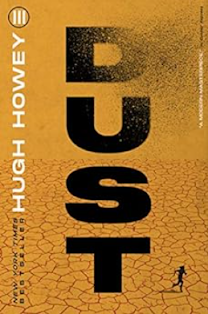I was eagerly anticipating my return to the captivating silo world in Hugh Howey's third installment, "Dust." Having been left on the edge of my seat by the brilliant cliffhanger in "Shift," I was eager to dive back into this dystopian universe. However, as the story picked up sometime later, I found myself questioning where all the new characters had come from.
Despite this initial curiosity, "Dust" quickly enveloped me in its narrative, delivering a satisfying continuation to the Silo Series. The mysteries and conflicts that emerged were expertly woven into the fabric of the established storyline, keeping me engrossed from start to finish.
While the story progression in "Dust" is certainly engaging, it's important to note a few continuation discrepancies that might catch the reader's eye. These inconsistencies become even more noticeable when listening to the audiobook. However, it's a testament to Howey's storytelling prowess that these minor discrepancies did not detract significantly from the overall enjoyment of the novel.
One of the strengths of "Dust" lies in its character development. Howey masterfully fleshes out both new and familiar characters, providing a deeper understanding of their motivations and connections. The emotional resonance of the story is heightened, making it a truly immersive experience. Apart from the brother and sister relationship. There wasn't enough history to make the emotional connection for me to 'feel' as that storyline reached a climax.
The world-building in "Dust" is as detailed as ever, with Howey expanding upon the intricacies of the silo society. The vivid descriptions and atmospheric details (especially near the end) create a tangible sense of place, immersing readers in the bleak yet fascinating environment.
Additionally, Howey skillfully addresses lingering questions from previous installments, delivering satisfying answers that contribute to the overall harmony of the series. The resolution of key plot points is handled not with finesse, but by bringing a sense of closure to the narrative.
"Dust" successfully maintains the high standards set by its predecessors in the Silo Series. Hugh Howey's ability to craft a compelling story, coupled with his intricate world-building and character development, makes this novel a must-read for fans of dystopian fiction. Despite a few minor hiccups, the overall experience is one of excitement, intrigue, and satisfaction. "Dust" is a worthy continuation of the Silo Series, offering a thrilling end to this exciting trilogy.
I would like a fourth book showing how they rebuild and gather the other silo people and restart the world.











